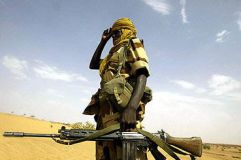Arms still pouring into Sudan’s Darfur – UN
April 28, 2006 (UNITED NATIONS) — Arms are still pouring into Sudan’s embattled Darfur region in violation of a U.N. arms ban, U.N. experts said on Thursday.

|
|
A rebel of the Justice and Equality Movement (JEM), fighting Sudanese troops, mans a post in the northern part of the western Sudanese Darfur.. |
The arms come from neighboring countries as well as nations outside the African continent, the panel of four experts said. They urged the Security Council to strengthen the embargo and better enforce it.
Their latest report mentioned by name only Chad as an arms source, but earlier reports have also cited Eritrea and Libya.
The council imposed an arms embargo on all non-government forces in Darfur in July 2004, to help end a civil war that has raged in the region since February 2003.
The conflict has pitted Sudanese rebels against government forces and allied militias, who have killed tens of thousands and driven 2 million people from their homes into miserable camps in Sudan and neighboring Chad.
The region has been further inflamed by a wave of cross-border attacks by Darfur-based Chadian rebels trying to topple Chadian President Idriss Deby ahead of a May 3 presidential election.
The experts said Sudan’s government in Khartoum has failed to live up to its responsibility to ensure that weapons it buys from legitimate suppliers do not end up in the hands of non-government forces in Darfur.
Instead, it transfers equipment and weapons into Darfur from other parts of the country to supply the mostly Arab militia groups that act as its proxy fighters. It also provides support to militia groups in their attacks on Darfur villages and rebel groups, the report said.
The Sudanese insist they have transferred weapons and additional troops to Darfur since 2005 “to address the conflict between Sudan and Chad.”
African Union forces in the region are looking into allegations Khartoum helped sponsor an April 13 attack by Chadian insurgents on Chad’s capital N’Djamena.
The experts’ accused Sudanese government forces of working hand-in-hand with militias in “perpetrating attacks on villages and to engage in armed conflict with rebel groups.”
The panel recommended that the council extend the arms embargo to all of Sudan, with the exception of the south, where a joint government-rebel coalition now governs as part of a peace agreement ending a separate civil war in that area.
It also called for a stronger mechanism to monitor compliance with the embargo, and said all U.N. member-nations should do their part to stem the flow of illicit weapons.
It said the council also should consider imposing unspecified sanctions on the government and rebel Sudan Liberation Army “as collective entities rather than on individuals for their actions that impede the peace process.”
The council this week slapped asset and travel freezes on four individuals it accused of impeding the peace process or violating international human rights law in Darfur but has not authorized such measures against “collective entities.”
